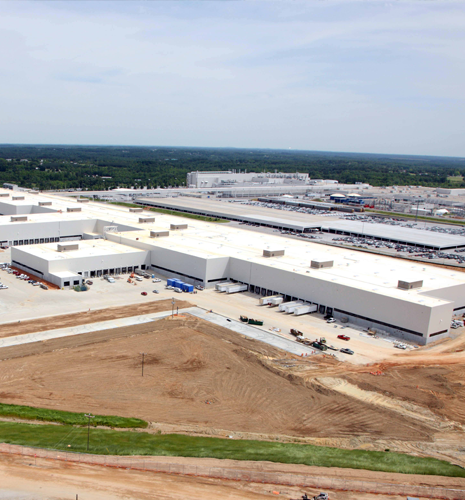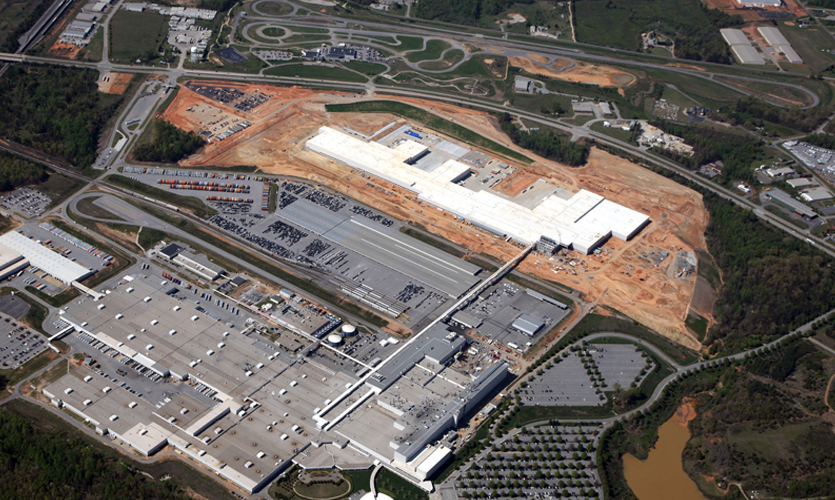Assembly Plant
BMW Group

When BMW needed additional production capacity at its most utilized campus in Spartanburg, South Carolina, they needed a firm known for their expertise in automotive facility design. Having completed a previous energy study for the automotive manufacturer and with recognized capabilities, SSOE was secured for the project. The expansion allowed BMW to increase their output from 160,000 to 240,000 automobiles annually.
SSOE provided the detailed architectural design as well as civil, structural, mechanical, electrical, and fire protection engineering services for the assembly plant built on an existing BMW site. With a multi-discipline team in place, SSOE’s scope for the new facility included design for parking areas, a central energy plant, conveyor enclosures, and all utilities required for the plant. Working against a compressed construction schedule, a comprehensive planning process allowed SSOE to meet an aggressive four-month design schedule. The results were plans for an energy efficient building, designed for future expandability.
SSOE also had to consider site challenges, including the property size, proximity to private residences, and mitigation of streams flowing across the corner of the property. The building’s design meets the Energy Policy Act of 2005 (EPAct 2005) standards for “Energy Efficient Commercial Buildings” and includes increases in insulation in the walls and roof, efficient lighting systems, high efficiency heating and cooling systems, and high efficiency hot water systems. The result is projected to produce a 50% total energy savings over the American Society of Heating, Refrigeration, and Air Conditioning Engineers (ASHRAE) recommended standards.



 Greenfield Transmission Plant
Greenfield Transmission PlantAutodesk Construction Cloud (ACC) is SSOE’s enterprise-wide project delivery platform. We partner with the Autodesk Product team and have research access. Use of the AI Assistant allows our design teams, owners, and general contractors the ability to query the project specifications for quality, answers, and more rapid responses to RFIs, submittals, or issues.
SSOE has developed a proof-of-concept to use an AI Agent to act as a Master Engineer and Architect trained in SSOE’s processes, best-known-methods, and trainings. Our data structure is being remodeled to enable better use of our proprietary knowledge to train the agent on the ‘SSOE way’.
SSOE is actively piloting AI Chat large language models (LLMs) or copilots that use Natural Language Processing (NLP) to streamline both design and development tasks, transforming how our teams interact with software and each other.
By integrating chat LLM engines into platforms like Revit, we’re enabling users to prompt complex actions using simple, conversational commands. In Revit, this means automating tasks such as modeling elements, cleaning up parameter data, managing annotations and dimensions, and organizing sheets—without writing scripts. These automations and quality prompts can be shared across project teams, accelerating workflows and reducing manual effort.
Similarly, our internal Software Development Community is leveraging GitHub Copilot to expedite coding tasks. Developers can generate and refine code using NLP prompts, tapping into GitHub’s extensive Repo to move faster from concept to implementation.
Together, these tools represent a shift from traditional, expert-driven scripting to intuitive, AI-assisted automation, unlocking new levels of efficiency and scalability across our projects.
We helped our client visualize and optimize façade design for occupant comfort—long before breaking ground through the use of the Autodesk Forma tool. It allows the designer to rapidly experiment with the building’s geometry and façade design to promote sustainability, prioritizing quality of spaces and comfort for end uses, especially in extreme climates (daylighting and microclimate analysis tools) at the project’s exact geographic location, using location-specific environmental data.
Discover how SSOE is using Autodesk Forma to improve sustainability outcomes for industrial projects: SSOE Group: Improving sustainability outcomes for industrial projects with Autodesk Forma.
SSOE is utilizing Microsoft Copilot Edge and M365 to significantly enhance work efficiency and accuracy across various departments. Copilot is accessible to all staff after training. Key areas of application include using it as a writing assistant, for idea generation, document summarization and generation, research assistant, excel assistant, programming code assistant, language translations, product comparison and data analysis. Use of Copilot has become part of the everyday life of SSOE employees who have identified key ways it can help them become more efficient with their daily tasks as well as more accurate in their deliverables.
Today, 100% of SSOE employees have taken the voluntary training and have access to Copilot Edge, achieving early our October 1, 2025 goal.
We found ourselves in need of a more robust tool to enhance resource forecasting and staff assignment capabilities. Instead of waiting for the perfect tool, we’re building it. SSOE’s in-house technology team has developed and piloted a tool that aims to forecast optimal staff mix and duration for new projects against existing workload to better understand capacity and manage resources efficiently. Additionally, the tool will allow teams to identify gaps to optimal staff mix.